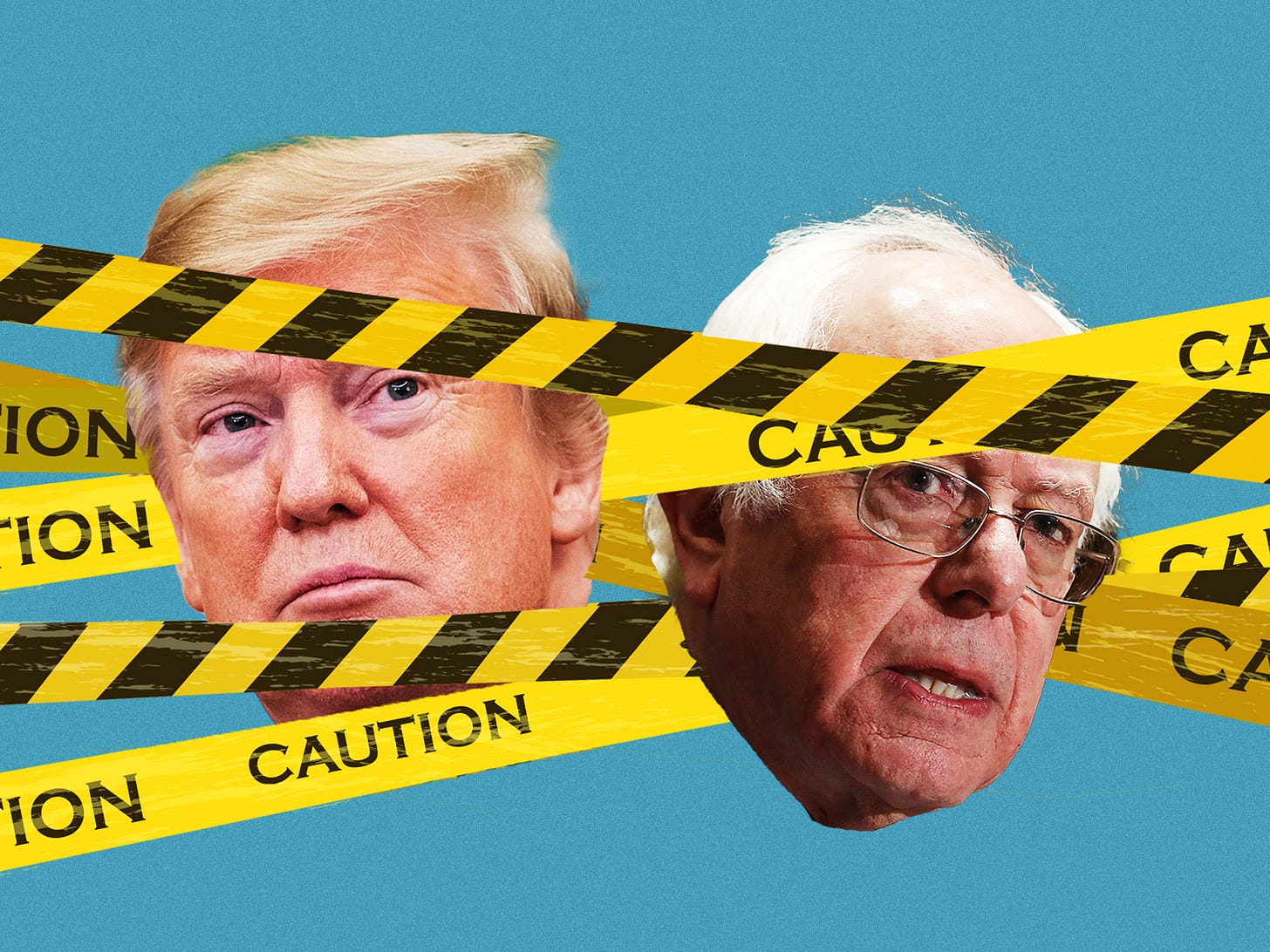Sanders and Trump: Striking Similarities
Their shared antipathy to mainstream U.S. policy gives the two men a lot in common.
Last week, Tim Miller showed the remarkable electoral parallels between Bernie ’20 and Trump ’16. His article got me thinking—because the similarities between Bernie Sanders and Donald Trump don’t end with poll numbers.
Both Sanders and Trump have affection for totalitarian dictators.
Both are into conspiracy theories.
Both despise American intelligence officers.
Both have spoken of their desire to end “the endless wars.”
Both want to cut support for America’s democratic allies.
Sanders brands himself a “democratic socialist.” But when provided the opportunity to join the long tradition of democratic socialists who oppose communism, he has refused to do so. Instead, he has praised Communist dictators such as Nicolás Maduro, Hugo Chávez, Fidel Castro—and even the Soviet Union. Such praise has included the claim that bread lines in communist countries were a sign of economic health.
Even with the Cold War long over, Sanders has refused to condemn Castro and continues to praise Cuba for its mythical healthcare and education systems.
Back in the 1980s, Sanders was a staunch supporter of the Nicaraguan dictator Daniel Ortega. As mayor of Burlington, Vermont, during those years, Sanders used public funds to show Communist propaganda movies from Cuba and Nicaragua on the local public-access TV while defending the Sandinistas’ crackdown on La Prensa, an opposition newspaper.
If Castro and Ortega are Sanders’s favorite dictators, Egyptian president Abd El-Fattah Al-Sisi is Trump’s favorite. Don’t take my word for it—Trump has said so himself. Although surely Vladimir Putin and Kim Jong Un must rank way up there, too, on Trump’s list of dictator faves.
Sanders and Trump are also similar in their thoughts on America’s democratic allies. Trump doesn’t care for NATO—he prefers Russia. Sanders doesn’t like Taiwan or Israel. He has consistently voted against selling security goods to and cooperating militarily with Taiwan. A few months ago, he praised the Chinese Communist Party for what it has done to eliminate poverty—even as Hong Kongers were protesting for their rights and waving American flags, and while Uighur Muslims are in concentration camps.
Both Sanders and Trump have been frequent users of the phrase “endless wars,” Trump in countless tweets, and Sanders in speeches and writings. Which is fine. It is only normal to want to end a war. What they really share is a mutual dishonesty about the degree of the U.S. involvement in those conflicts—the number of U.S. military personnel now in Iraq and Afghanistan combined is about half the number in Germany today, and the annual cost of both is now around 5 percent of the annual discretionary budget of the federal government. Just like Trump, Sanders, too, has a fundamental problem with facts, when it comes to war and international affairs.
Oh, and one other way that Sanders and Trump are similar? They have sometimes voiced their doubts about the facts of modern science and medicine. Trump is of course famous for opposing childhood vaccines and hinting that he believes in the debunked notion that vaccines cause autism:
Sanders, for his part, isn’t anti-vaccines. But bizarrely, back in 1988 he claimed that Nora Astorga—a Sandinista politician and a cold-blooded murderer—had gotten the cancer that ended her life because of the war in Nicaragua: “I have my own feelings about what causes cancer, and the psychosomatic aspects of cancer,” Sanders said. “One wonders if the war didn’t claim another victim; a person who couldn’t deal with the tremendous grief and suffering in her own country.” Here’s how he expressed much the same kooky idea back in 1969: “When the human spirit is broken, when the life force is squashed, cancer becomes a possibility.”
So add a shaky grasp of the basics of medical science to the list of ways Sanders and Trump are strangely alike.



